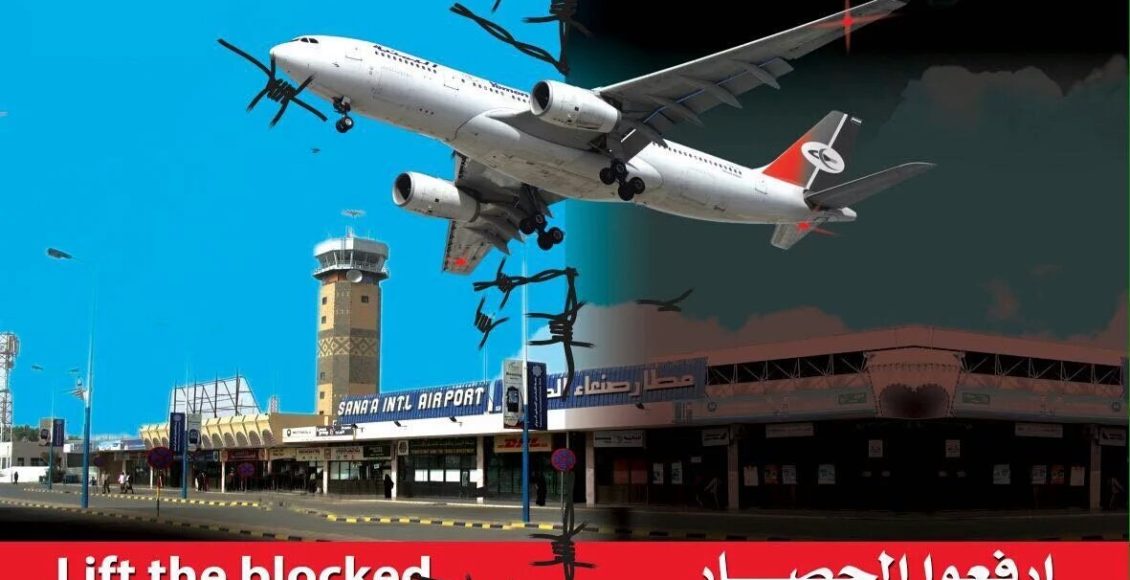The aggressive countries participating in the aggression on Yemen resort to adopting the policy of siege and economic sanctions to starve and subjugate the oppressed civilians of Yemen, after failing to win militarily for over eight years.
Yemen blockade:
The US-Zionist-Saudi-Emirati coalition of aggression against Yemen, after its military defeat and failure in subduing the Yemeni people, resorted to the method of siege, starvation and suffocation without regard for any humanitarian aspect.
After the Yemeni people gained various wins on the battlefield, which were thanks to the steadfastness of the Yemeni armed forces, the aggressive Saudi-led coalition tightened its blockade all over Yemen, forgetting that is a war crime that cannot be negotiated. It also goes in the same context of their aggression and military war against the Yemeni people, and it is also punishable by international laws and covenants.
Procrastination and disastrous results:
The reality of the political negotiations taking place between Sana'a and the countries of the US-Saudi-Emirati aggression under the auspices of the Sultanate of Oman indicates that nothing promising is on the horizon, as the aggression coalition still insists on linking the humanitarian file with the military and political files, and delays the implementation of the demands of the Yemeni people and refuses to pay the salaries of all employees, open Sana’a International airport, open the port of Hodeidah, and completely solve and end prisoners’ file.
Therefore, this means the continuation of the blockade despite the disastrous results of it, which were reflected in the living life of the Yemeni citizen in the form of daily suffering that squeezes the Yemeni people and is exacerbated day by day.
Proof witnesses:
A special report by Reuters, entitled (In blocking arms to Yemen, Saudi Arabia squeezes a starving population) stated that, “Since 2015, Saudi Arabia and its allies from the Arab countries have deployed naval forces in and around Yemeni waters. Western countries agreed to this show of force as a means to prevent weapons from reaching Ansar Allah fighters, the “Houthis,” as they claimed, stressing that this actual blockade had a heavy price on the humanitarian level.
The report added: “Unpublished maritime records, a confidential UN report, and interviews with humanitarian relief agencies and shipping lines show that Saudi-led coalition ships are preventing essential supplies from entering Yemen even when the ships are not carrying weapons.”
A Human Rights Watch report stated, "Significant restrictions on the delivery of basic commodities to the civilian population in Yemen still exist, and that the aggression coalition did not indicate whether it would allow the seaports under the control of Ansar Allah (Houthis) to resume receiving commercial shipments, which include fuel and medicines, while the World Food Program estimates that even with the partial lifting of the blockade, an additional 3.2 million people will suffer from starvation, with the possibility of 150,000 children suffering from malnutrition dying in the following months.
The report revealed that 12 relief agencies have called for the aggression coalition to reopen Sana'a airport, noting that commercial flights "often bring vital supplies and also allow freedom of movement for civilians."
For its part, the human rights organization "Mwatana" documented cases of preventing people suffering from chronic diseases from traveling abroad for treatment, including a woman who needed heart surgery and later died.
While a statement by the Belgian International Organization for Human Rights said that the continued closure of Sana'a airport led to the unemployment of about 3 million people, preventing thousands of patients from traveling for treatment outside the country, and affecting the industrial and commercial sector in general.
“There are thousands of patients who need to travel abroad to obtain medical care in hospitals specializing in the treatment of cancerous tumors, kidney transplantation, diseases, and surgeries of the heart, brain and nerves, and hundreds of them have died as a result of not receiving the necessary treatment in a timely manner. There are also thousands of civilians who have been injured in the ongoing war in Yemen, and they need to travel abroad to receive treatment in more advanced hospitals, and they cannot travel by land from Sana’a to Seiyun airport due to their health condition, because they cannot afford to travel for a 20 hours trip, despite the security risks, and the high cost of travelling that has gone up by 200%, which increased the suffering of the Yemeni citizen that has a limited income and is forced to travel outside Yemen for treatment," the Belgian organization said.







